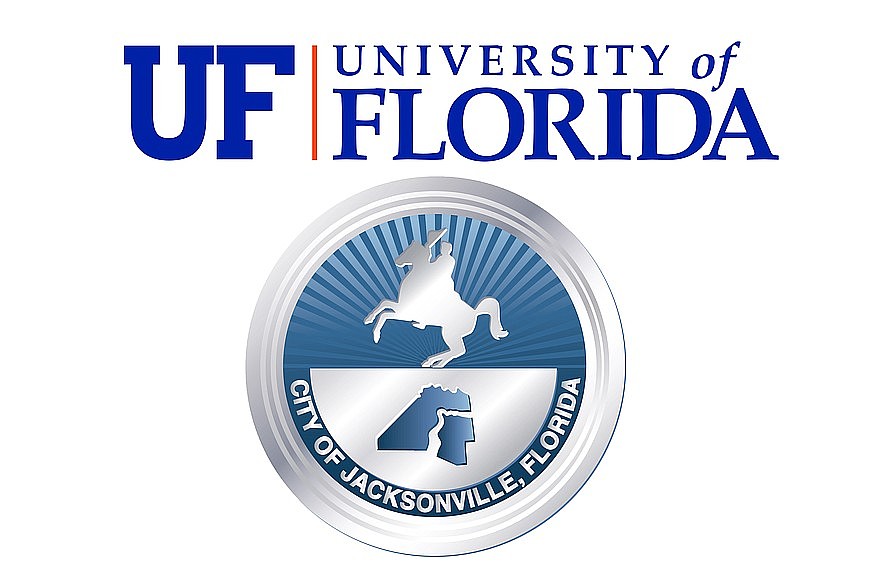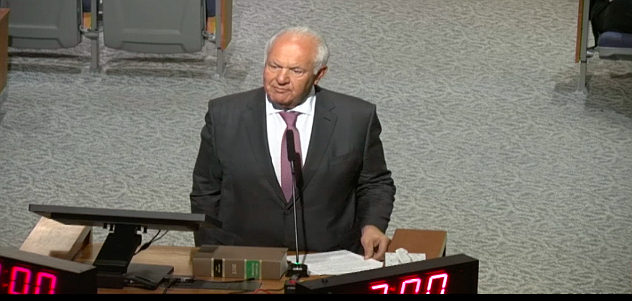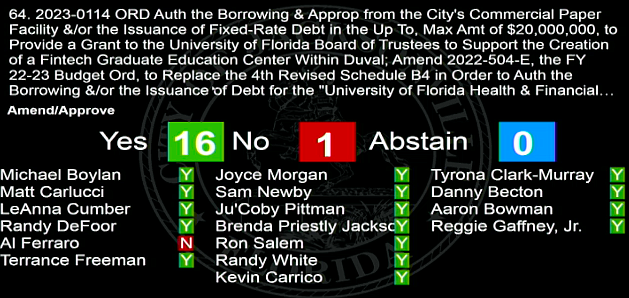
The Jacksonville City Council agreed to contribute $50 million over the next three years to support the University of Florida’s proposal to build a health and financial technology graduate center in the Downtown area.
The Council’s 16-1 vote March 14 will provide $20 million in the current fiscal year for capital expenses including studies, planning, design and other soft costs to explore establishing what could be a $200 million center.
Al Ferraro was the only “no” vote March 14. Rory Diamond and Nick Howland were absent for the vote.
UF has yet to say where the center will be built or explain its curriculum in detail.
Ordinance 2023-0114 states the city’s intention to invest an additional $30 million in fiscal years 2024 and 2025, but that will require additional Council approval.
Despite questions, a majority of Council members were adamant that expanding UF’s fintech, health and engineering presence and status as a research institution Downtown would bolster the local economy.
“Not one company grows here or moves here without talent available,” Council Finance Committee Chair Aaron Bowman said during debate of the bill in a March 7 meeting.
Bowman is senior vice president of business development advanced manufacturing for JAXUSA Partnership, the economic development division of JAX Chamber.
“I can tell you over the 10 years I’ve been doing that, if this facility was in operation over those last 10 years, we’d have a different landscape here,” he said.
Before the March 14 vote, Council member Randy DeFoor said a UF graduate center could keep Jacksonville’s fintech and health care sectors from repeating the city’s banking and insurance industry losses to cities like Charlotte, North Carolina, because of talent.
“We have a labor shortage within all sectors both in business, in health care and in finance, and you know where the businesses go? They go where the talent exists,”
“This is our opportunity to really change the future of Jacksonville,” she said.
Council members made some changes to the deal since Feb. 7 when Mayor Lenny Curry, UF President Ben Sasse and university Board of Trustees Chair Mori Hosseini announced the project.

After he played a hype video for Council on March 14 outlining UF’s research and investment statistics, Hosseini highlighted UF Health Jacksonville’s recent facilities investments as proof of the university’s interest in the city.
“We feel a special bond with Jacksonville and believe it is our responsibility to help if we can,” he said.
“We understand the desire for UF to be physically present with targeted graduate and professional programs in your Downtown because we see the potential, too.”
Council members wanted more details about how the city’s money would be spent and tracked and want to clear up a fuzzy project timeline.
An amendment to the bill and term sheet says the graduate center will be completed no later than five years after commencement of site improvements. The deal would expire no later than 10 years after both parties execute the agreement.
UF commits to securing $100 million in funding for design and construction from sources other than the city of Jacksonville. The city will withhold its final $2.5 million until the university shows it has reached $100 million in expenditures
The city will reimburse UF quarterly for costs related to the project. The university is required to report its revenue sources for the project, including state funding and private donations.
Council auditors said March 7 that the bill does not include safeguards for the city to claw back city money spent should the project be delayed or fall through.
UF recently put on hold a fintech project proposed for Palm Beach County.
Florida House Rep. Wyman Duggan filed a $50 million appropriations request Feb. 13 that would be added to $100 million in proposed city and private sector contributions for the graduate center.
Duggan said it is possible the state appropriation could reach $100 million as his bill is heard in subcommittees.
“Our money is kind of last in to the project when it comes down to actually spending. The commitment is up to $100 million of noncity funding. We’re 50-50 on this deal,” Curry administration CFO Joey Greive said March 7.
Officials say the center would support local workforce demands in biomedical technology, health applications of artificial intelligence, patient quality and safety, health care administration and fintech.
UF Vice President for Government and Community Relations Mark Kaplan told the Council Finance Committee that initial target estimates are 10,000 students enrolled at the graduate center by year 10.
Will it be Downtown?
Because UF officials haven’t determined a location, Council members added a provision to the term sheet to limit the site search to a 2-mile radius beyond the Downtown Investment Authority’s Community Redevelopment Areas to keep the center in or near Downtown.
“I think putting an institution in a place where opportunity is needed the most is a value that we should all rally behind,” Council member Matt Carlucci said March 7.
Duggan said people close to the project say UF is reviewing land that’s part of Florida State College at Jacksonville’s Downtown Campus and the Greater Jacksonville Agricultural Fairgrounds near TIAA Bank Field.
Kaplan told the Council Finance Committee that the graduate center would need about 15 acres.
Iguana Investments Florida LLC, the economic development company controlled by Jacksonville Jaguars owner Shad Khan, has an agreement to buy the 14.1-acre fairgrounds at 510 Fairgrounds Place.

Higher ed ‘ecosystem’
Council members have received several emails opposing city funding for the project, but the proposal has support from some Northeast Florida business leaders.
The Jacksonville Civic Council, a group of about 80 CEOs and corporate leaders in the region, sent a letter March 3 endorsing the project and the city’s investment.
The letter, signed by Civic Council Chair Eric Mann said interim CEO and President Jeanne Miller, says cities create high-tech research hubs to build a complete “higher education ecosystem” to offer certification and degrees at every level.
The business leaders said the program could distinguish Jacksonville among Southeastern U.S. cities.
“By leveraging the University of Florida’s R1 research dollars and positioning the urban center as a leading anchor for advanced higher education opportunities in our downtown core, we feel confident that the community will be able to address the increasing demand for highly skilled talent,” Mann and Miller wrote.
Kaplan didn’t give a clear answer when Bowman asked March 7 how the UF center would coordinate with the University of North Florida, Jacksonville University, Edward Waters University and Florida State College at Jacksonville to ensure students could have an easy transition into the UF graduate programs.
“The goal here is not to compete but to complement, to fill in gaps,” Kaplan said.
“As we move forward, there is going to have to be a lot of those detailed discussions about how we fit in and how that kind of progression takes place. But know that is a priority and a commitment.”